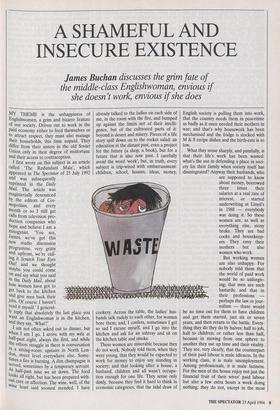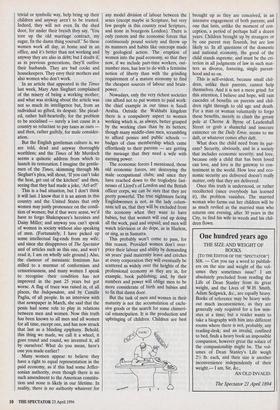A SHAMEFUL AND INSECURE EXISTENCE
James Buchan discusses the grim fate of
the middle-class Englishwoman, envious if she doesn't work, envious if she does
MY THEME is the unhappiness of Englishwomen, a grim and bizarre feature of our society. Driven out to work in the paid economy either to feed themselves or to attract respect, they must also manage their households, this time unpaid. They differ from their sisters in the old Soviet Union only in their degree of misfortune and their access to contraception.
I first wrote on this subject in an article called 'The Redundant Male', which appeared in The Spectator of 25 July 1992 and was subsequently reprinted in the Daily Mail. The article was magisterially denounced by the editors of Cos- mopolitan, and every month or so I still get calls from television pro- duction companies who hope and believe I am a misogynist. 'You see, James, we've got this new studio discussion programme, very gritty and upfront, we're call- ing it Scratch Your Eyes Out! and we thought maybe you could come On and say what you said In the Daily Mail, about how women have got to get back to the kitchen and give men back their Jobs. Of course I haven't read it myself.' I general- ly reply that absolutely the last place you want an Englishwoman is in the kitchen, and they say, 'What?' I am not often asked out to dinner, but when I am I go. I arrive with my wife at half-past eight, always the first, and while the others straggle in there is conversation In a sitting-room: upstairs in North Lon- don, street level everywhere else. Some- times a fire is burning. A dim champagne is served, sometimes by a temporary servant. At half-past nine we sit down. The food looks all right, but has been prepared with- out care or affection. The wine, well, of the wine least said soonest mended. I have already talked to the ladies on each side of me, in the room with the fire, and bumped up against the limits not of their intelli- gence, but of the cultivated parts of it: beyond is desert and misery. Pieces of a life story spill down on to the rocket salad: an education in the distant past, even a project for the future (a shop, a book), but for a future that is also now past. I carefully avoid the word 'work', but, in truth, every subject is trip-wired with embarrassment: children, school, houses, ideas, money, cookery. Across the table, the ladies' hus- bands talk rudely to each other, for women bore them; and, I confess, sometimes I get so sad I excuse myself, and I go into the kitchen and ask for an ashtray and sit on the kitchen table and smoke.
These women are miserable because they do not work. Nobody told them, when they were young, that they would be expected to work for money to enjoy any standing in society; and that looking after a house, a husband, children and all wasn't occupa- tion enough for one life. They sense only dimly, because they find it hard to think in economic categories, that the tidal draw of English society is pulling them into work, that the country needs them in peacetime as badly as it once needed their mothers in war; and that's why housework has been mechanised and the fridge is stocked with M & S recipe dishes and the birth-rate is so low.
But working women are also unhappy. For nobody told them that the world of paid work would be so unforgiv- ing; that men are such bastards; and that in their professions perhaps the law or jour- nalism — there would be no time out for them to have children and get them started, just six or seven years, and then return to the battle. Every- thing they do they do by halves: half to job, half to children; or rather less than half, because in moving from one sphere to another they use up time and their vitality. They see, very clearly, that the counterpart of their paid labour is male idleness. In the working class, it is male unemployment. Among professionals, it is male laziness. For the men of the house enjoy not just the financial fruit of their wives' paid labour but also a few extra hours a week doing nothing; they do not, except in the most trivial or symbolic way, help bring up their children and anyway aren't to be trusted. Indeed, they will not even fix the shed door, for under their breath they say, You tore up the old marriage contract, my sugar, fix the damn thing yourself.' So these women work all day, at home and in an office, and it's better than not working and anyway they are also in debt; but I doubt if, as in previous generations, they'll outlive their husbands. They are bad cooks and housekeepers. They envy their mothers and also women who don't work.
In an article that appeared in the Times last week, Mary Ann Sieghart complained of the misery of being a working mother; and what was striking about the article was not so much its intelligence but, from an individual so gifted, its despair. She plead- ed, rather half-heartedly, for the problem to be socialised — surely a lost cause in a country so reluctant to pay taxes as ours and then, rather guiltily, for male consider- ation.
But the English gentleman culture is, we are told, dead and anyway thoroughly worthless; and the Times of Mr Murdoch seems a quixotic address from which to launch its restoration. I imagine the gentle- men of the Times, skimming through Ms Sieghart's plea, will shout, 'If you can't take the heat, get out of the kitchen!' and then, seeing that they had made a joke, `Arf-arf!'
This is a bad situation, but I don't think it will last. I know that it is an axiom in this country and the United States that only women may justly pronounce on the condi- tion of women; but if that were sense, we'd have to forgo Shakespeare's heroines and Daisy Miller; and anyway you can't speak of women in society without also speaking of men. (Fortunately, I have picked up some intellectual fag-ends from my wife; and since she disapproves of The Spectator and of articles such as this one, and won't read it, I am on wholly safe ground.) Also, the clamour of messianic feminism has stilled to a murmur of conformism and censoriousness, and many women I speak to recognise their condition has not improved in the past 25 years but got worse. A flag of truce was raised in, of all places, the independent, and by Camille Paglia, of all people. In an interview with that newspaper in March, she said that the penis had some role to play in relations between men and women. Now this truth has been known to all men and all women for all time, except one, and has now struck that last as a blinding epiphany. Behold, this thing we made, we call it a wheel, it goes round and round, we invented it, all by ourselves! What do you mean, here's one you made earlier?
Many women appear to believe they have a right to equal representation in the paid economy, as if this had some Jeffer- sonian authority, even though there is no such amendment to the American constitu- tion and none is likely in our lifetime. In reality, there is no authority whatever for any model division of labour between the sexes (except maybe in Scripture, but very few people in this country read Scripture, and none in bourgeois London). There is only custom and the economic forces that continuously pound society and throw up its manners and habits like outcrops made by geological action. The eruption of women into the paid economy, so that they now, if we include part-time workers, out- number men, has less to do with a feminine notion of liberty than with the grinding requirement of a mature economy to find the cheapest sources of labour and brain- power.
Nowadays, only the very richest societies can afford not to put women to paid work: the chief example in our times is Saudi Arabia. Outside the Wahhabi kingdom there is a compulsory aspect to women working which is, as always, better grasped by the working class than by its betters; though many middle-class men, scrambling to afford ponies and public schools badges of class membership which came effortlessly to their parents — are getting the message that they need a wife with earning power.
The economic forces I mentioned, those old economic forces, are destroying the male occupational clubs; and since they have reached down to the troglodyte fast- nesses of Lloyd's of London and the British officer corps, we can be sure that they are pretty powerful. The true nightmare facing Englishwomen is not, as the lady colum- nists tell us, that they will be excluded from the economy when they want to have babies, but that women will end up doing all the work, paid and unpaid; and men will watch television or do dope, as in Harlem, or sing, as in Sumatra.
This probably won't come to pass, for this reason. Provided women don't over- price their labour and ability by demanding six years' paid maternity leave and crèches at every corporation they will eventually be scattered as widely over the heights of the professional economy as they are in, for example, book publishing; and, by their numbers and power will oblige men to be more considerate of birth and babies and to fix that damn door.
But the task of men and women in their maturity is not the accumulation of exclu- sive goods or the search for some chimeri- cal emancipation. It is the production and upbringing of children. Children are best brought up as they are conceived, in an intensive engagement of both parents; and one that lasts, unlike the moment of con- ception, a period of perhaps half a dozen years. Children brought up by strangers or by one parent may flourish, but are less likely to. In all questions of the domestic and national economy, the good of the child stands supreme; and must be the cri- terion in all judgments of law in such mat- ters as divorce, fostering, single parent- hood and so on.
This is self-evident, because small chil- dren, unlike their parents, cannot help themselves. And it is not a mere grind: for this attention, I believe and hope, will rain cascades of benefits on parents and chil- dren right through to old age and death. For a man or woman voluntarily to forgo these benefits, merely to climb the greasy pole at Cherne & Byrne of Leadenhall Street or grub a shameful and insecure existence on the Daily Error, seems to me daft, or whatever comes after daft.
What does the child need from its par- ents? Security, obviously, and in a society that includes economic security; and love, because only a child that has been loved can love, and love is the gateway to con- tentment in the world. How love and eco- nomic security are delivered doesn't really matter, only that they are delivered.
Once this truth is understood, or rather recollected (since everybody has learned it), the problem vanishes. The married woman who farms out her children will be as much reviled as the married man who returns one evening, after 30 years in the City, to find his wife in weeds and his chil- dren flown.



























































 Previous page
Previous page